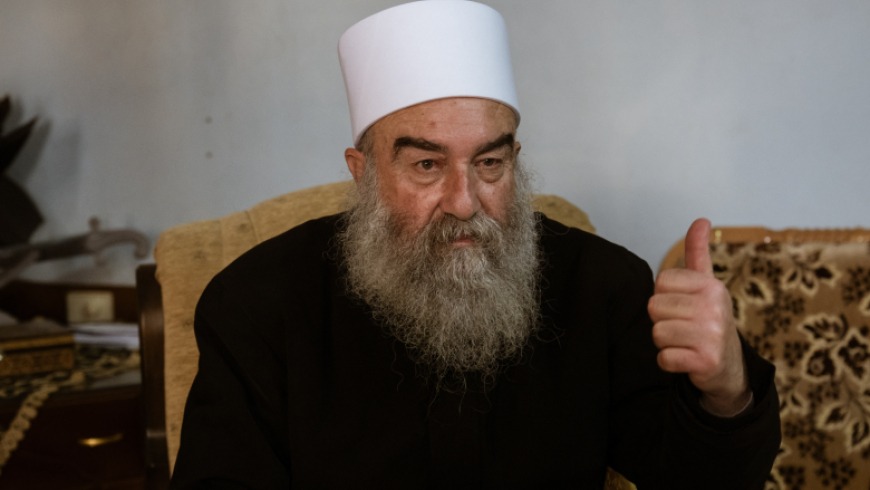As the southern Syrian province of Suweida grapples with crisis and upheaval, one name looms large over the headlines: Sheikh Hikmat al-Hijri. Once confined to his role as a spiritual authority among Syria’s Druze community, Hijri has, over the past decade, evolved into one of the most polarizing political actors in the country’s post-Assad landscape.
His rise is emblematic of a broader shift in Syria, where local and sectarian leaders—often sidelined or co-opted under Baathist authoritarianism—have reasserted themselves amid the state’s collapse and the contested reconstruction of authority.
A Complicated Inheritance
Hijri inherited the title of Sheikh al-‘Aql, or chief Druze religious leader, under unusual circumstances following the death of his brother in a car accident. Though initially perceived as a reluctant heir to the position, close associates suggest he had long harboured ambitions to revive the influence of the role—once a prestigious post with both spiritual and political clout—beyond the ceremonial status it had been reduced to under Baathist rule.
His lineage only strengthened this aspiration. He descends from a revered line of Druze religious leaders. His ancestor, Sheikh Ibrahim al-Hijri, became a semi-mythical figure among the Druze for leading resistance against Egyptian ruler Ibrahim Pasha in the 19th century. Later, Sheikh Ahmad al-Hijri, who died in 1953, emerged as a national figure during the French Mandate and early independence, hosting Syrian nationalist leaders in his home.
However, by the time Sheikh Hikmat assumed the position, the Syrian state under Hafez and then Bashar al-Assad had significantly diminished the autonomy of traditional religious and tribal leadership. Religious figures—including Druze clerics—were expected to conform to the role of mashāyikh al-sultān (“clergy of the regime”), often receiving government cars and stipends in exchange for political loyalty.
Hijri initially conformed to this mold, but according to those close to him, he did so begrudgingly, hiding a long-standing desire to break with this dependency and restore the role’s former significance.
From Symbol to Separatist?
The 2011 uprising—and especially the unrest in Suweida—provided al-Hijri an opening. By the final years of Bashar al-Assad’s rule, al-Hijri had aligned himself with popular opposition movements in the province, notably the Karama Square protests, where he gained a following as a spiritual figure advocating for civil resistance.
After Assad’s fall in late 2024, Hijri’s home became a political pilgrimage site, receiving delegations from across Syria. Some began likening him to Sultan al-Atrash, the legendary Druze leader of the 1925 Syrian Revolt against the French. But what appeared as a return to nationalist heroism soon veered in a very different direction.
Critics argue that Hijri’s increasingly political tone—calling for a new constitution, secular democracy, and inclusive dialogue—began to sound less like civic demands and more like sectarian bargaining. Speaking on behalf of “the Druze” as a bloc, he inadvertently positioned his community in direct confrontation with the Sunni majority, they argue. His demands, while at times justified, came to be viewed through a communal lens rather than as universal principles.
Worse still, say his detractors, was his shift from spiritual guide to would-be regional actor. Hijri began to engage with foreign powers and speak of the Druze as a distinct regional force. His circle maintained informal communications with U.S. contacts—allegedly through his relative, Khaldoun al-Hijri, based in the United States—as well as less publicized exchanges with Druze leadership in Israel.
The Shadow of Sheikh Mowafaq Tarif
One of the most controversial dimensions of Hijri’s role is his alleged relationship with Sheikh Mowafaq Tarif, the Druze spiritual leader in Israel. Though the two have never publicly acknowledged contact, numerous activists in Suweida describe their connection as an “open secret.” Lebanese Druze leader Walid Jumblatt hinted as much in a recent interview, suggesting that al-Hijri is “influenced” by Tarif—a statement seen by many as a diplomatic understatement.
Members of Hijri’s inner circle reportedly consult Tarif’s “advice” on political positioning, especially regarding international actors. Analysts speculate that Tarif encouraged Hijri to capitalize on Israeli, American, and European pressure on Damascus to extract local gains for Suweida—an idea many see as reckless and destabilizing. Such manoeuvres, they warn, risked rupturing the fragile social fabric of Syria even further.
Indeed, the Syrian government has been accused of playing both sides of this dynamic: turning a blind eye to Israeli messaging toward the Druze at first, only to later use those same messages to rally public opinion against Hijri and justify military actions. At the same time, pro-government factions reportedly carried out sectarian attacks in Druze areas near Damascus, lending credence to Hijri’s suspicions and reinforcing his base.
Still, some believe the tide may be turning. Both the U.S. and Israel appear to have distanced themselves from Hijri’s escalating rhetoric in recent weeks. Sheikh Tarif, too, is said to have backed away from the Syrian cleric. These developments raise a critical question: on what basis did Hijri continue to escalate his confrontation with the new Syrian government?
What Comes Next?
With the Syrian Ministry of Interior now in control of Suweida following the recent Israeli strikes and internal security deployment, Hijri’s future hangs in the balance. Some sources suggest that a behind-the-scenes deal—possibly brokered by Walid Jumblatt—is in the works, though details remain murky.
For now, Sheikh Hikmat al-Hijri stands at a crossroads: once a revered spiritual leader, then a national symbol of civil resistance, and now a polarizing figure whose political ambitions may have overstepped both his mandate and his moment. Whether history remembers him as a visionary or a divisive opportunist will depend on how the days ahead unfold—and on how far Syria is willing to go to reconcile its fractured identities.
This article was translated and edited by The Syrian Observer. The Syrian Observer has not verified the content of this story. Responsibility for the information and views set out in this article lies entirely with the author.


